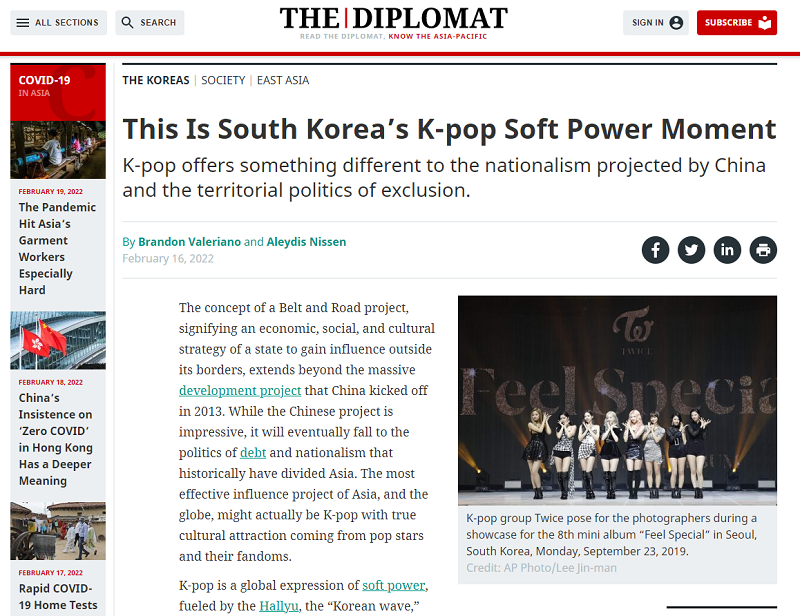
A column on The Diplomat, a U.S.-based diplomacy and security magazine, posted on Feb. 16 called K-pop and Hallyu (Korean Wave) "the true forms of soft power" that can impact international relations. (Screen capture from Diplomat)
K-pop and Hallyu (Korean Wave) are "true forms of soft power" that can impact international relations, according to a column on The Diplomat, a U.S.-based diplomacy and security news magazine.
Titled "This is South Korea's K-Pop Soft Power Moment" and written by Brandon Valeriano and Aleydis Nissen, the piece posted on Feb. 16 said, "South Korea is challenging not only the cultural ascendancy the United States maintains but the course for the future of Asia."
It mentioned examples of the worldwide success of K-pop and Hallyu such as BTS in 2020 topping the Billboard Hot 100 singles chart and director Bong Joon-ho's "Parasite" winning the Oscar for Best Picture in the same year.
"Korean culture is a force to be reckoned with," it said. "Instead of national identity creating fault lines, in K-pop, divergent national representation presents an opportunity for culture and economic dominance through collectivization of artistic expression."
As for key success factors, the column mentioned globalization strategies including the inclusion of foreign members in K-pop groups, Korea's leading digital technology, development of social media and nullification of politics.
"K-pop's expansion north to Russia, east to the United States, west to India, and south to Oceania demonstrates that its global domination is only beginning," it said. "The tentacles of Korean cultural attraction, the literal definition of soft power, extend globally, infecting the minds of a new generation no longer concerned with the politics of their elders."
"The infectious positivity common in K-pop can trump even nationalism."
"It can form an approximation of hard power through music and activism that is more powerful than any missile system that Korea could develop," it added.
"The power of K-pop is in the fandom. This fandom develops global reach and now seeks to influence daily life," the piece said. "This is also the hope of K-pop as an alternative to the destructive politics of confrontation typical in international politics."
hayeounk8@korea.kr